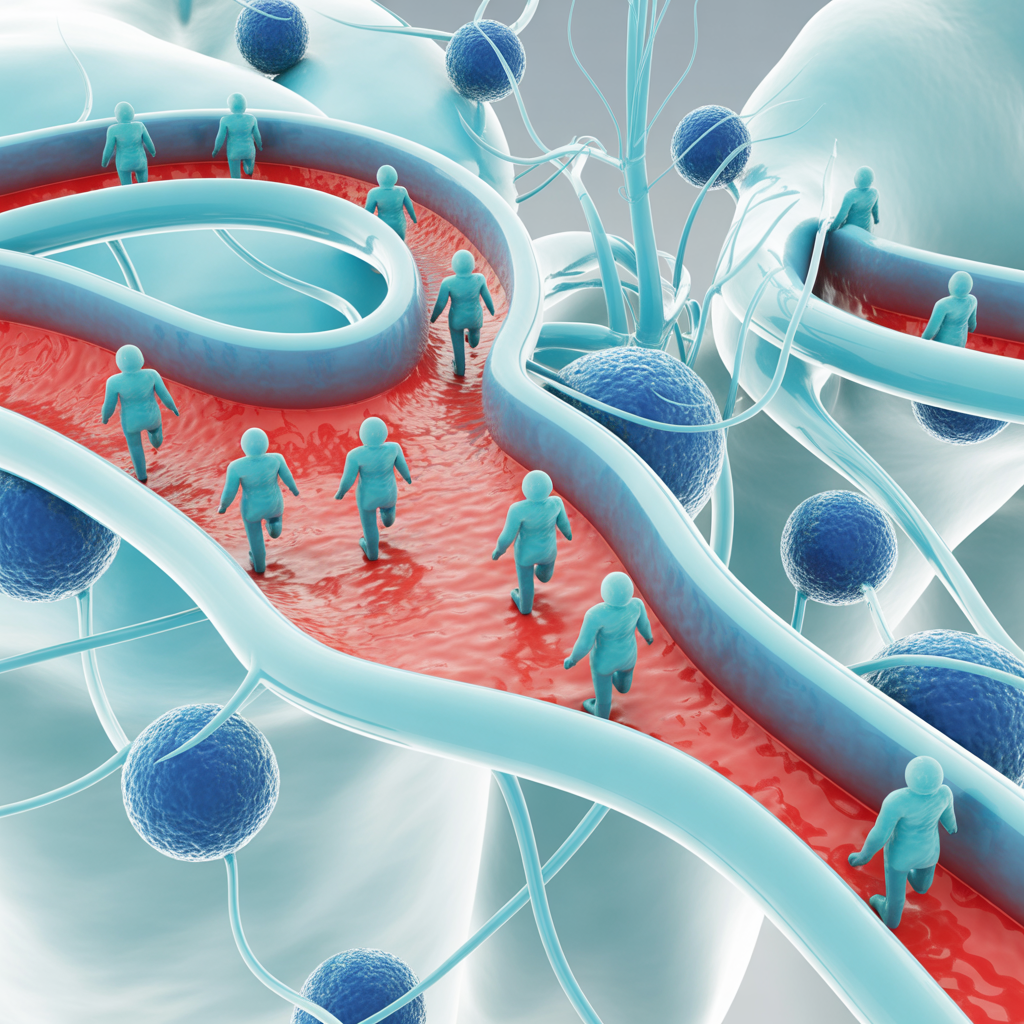Every single day, your body faces an invisible battle against countless potential threats—bacteria, viruses, fungi, and other harmful substances that could make you sick. Yet most of the time, you remain healthy and unaware of this constant protection. This remarkable defense system is your immune system, a sophisticated network that works tirelessly to keep you safe. Understanding how this incredible system functions can help you appreciate the amazing work happening inside your body right now and learn how to support your natural defenses through healthy lifestyle choices.
What Is Your Immune System?
Think of your immune system as your body’s personal security team—a complex network of cells, tissues, and organs working together to identify and eliminate anything that doesn’t belong in your body. Just like a well-organized security system protects a building, your immune system protects you from harmful invaders that could cause illness or damage.
This defense network is incredibly sophisticated, capable of distinguishing between your own healthy cells and foreign substances that might pose a threat. It’s often called your body’s “defense network” because it operates like a coordinated military operation, with different components playing specific roles in keeping you healthy.
What makes your immune system truly remarkable is its ability to adapt and learn. Once it encounters a specific threat, it can remember it and respond more quickly and effectively if that same threat appears again in the future.

The Main Players in Your Immune System
White Blood Cells – Your Body’s Soldiers
White blood cells, also known as leukocytes, are the primary soldiers in your immune system army. These specialized cells are produced mainly in your bone marrow and are constantly circulating through your bloodstream and lymphatic system, patrolling for potential threats.
There are several different types of white blood cells, each with specific roles in protecting your body. Some act as scouts, identifying foreign substances, while others function as direct attackers, destroying harmful invaders. Still others serve as cleanup crews, removing damaged cells and debris from battle sites.
These cellular defenders are incredibly mobile, able to travel through your bloodstream and squeeze through tiny spaces between cells to reach areas where they’re needed most. When your body detects a threat, it can rapidly increase white blood cell production to mount a stronger defense.
Your Lymphatic System – The Highway Network
The lymphatic system serves as the transportation highway for your immune system, consisting of a network of vessels, nodes, and organs that help circulate immune cells throughout your body. Lymph nodes act as filtering stations where harmful substances are trapped and destroyed.
You might notice your lymph nodes—small, bean-shaped structures located in areas like your neck, armpits, and groin—become swollen when you’re fighting an infection. This swelling is actually a sign that your immune system is working hard, as the nodes fill with white blood cells battling invaders.
The lymphatic system also helps maintain fluid balance in your body and transports important immune proteins to where they’re needed most.
Other Key Defenders
Your skin serves as your body’s first and most important physical barrier, preventing most harmful substances from entering your body in the first place. This remarkable organ is more than just a covering—it’s an active participant in your immune defense.
Your bone marrow works like a manufacturing center, continuously producing the various types of blood cells your immune system needs. Meanwhile, organs like your spleen help filter your blood and remove old or damaged cells, while your thymus helps train certain types of immune cells to recognize threats properly.
How Your Immune System Protects You Daily
First Line of Defense
Your body’s protection begins with physical and chemical barriers that prevent harmful substances from entering in the first place. Your skin forms an nearly impenetrable wall, while mucus in your nose and throat traps particles and germs before they can reach deeper into your body.
Other chemical defenders include tears that wash away irritants from your eyes, saliva that contains antibacterial substances, and stomach acid that destroys many harmful microorganisms before they can cause problems in your digestive system.
These barriers work automatically and continuously, providing round-the-clock protection without any conscious effort on your part.

When Invaders Get Through
Despite your body’s impressive barriers, some harmful substances occasionally manage to get through. When this happens, your immune system springs into action with a coordinated response designed to identify, contain, and eliminate the threat.
The inflammatory response is one of your body’s most important defensive mechanisms. When tissues are damaged or infected, your immune system triggers inflammation to increase blood flow to the affected area, bringing more immune cells and nutrients to fight the problem. This is why injured or infected areas often become red, warm, and swollen.
Fever is another protective response that helps your immune system work more effectively while making conditions less favorable for many harmful microorganisms. While these responses might cause temporary discomfort, they’re actually signs that your immune system is doing its job.
Building Memory for Future Protection
One of the most amazing features of your immune system is its ability to remember previous encounters with harmful substances. After successfully fighting off a threat, specialized memory cells retain information about that specific invader.
This immunological memory explains why you typically don’t get the same illness twice—your immune system can recognize returning threats and mount a much faster, more effective response. This memory system forms the basis of how vaccines work and why they’re so effective at preventing certain diseases.
The development of immunity is a gradual, natural process that continues throughout your life as your immune system encounters and learns from various challenges.
Signs Your Immune System Is Working
Many of the symptoms we associate with being sick are actually signs that our immune system is actively fighting to protect us. A runny nose helps flush out irritants, a cough clears harmful substances from your airways, and fatigue encourages rest so your body can focus energy on healing.
Mild inflammation around a cut or scrape shows your immune system is working to prevent infection and promote healing. Similarly, the temporary discomfort of swollen lymph nodes indicates that your body’s filtering stations are actively processing and eliminating threats.
Understanding that many immune responses are protective rather than harmful can help you appreciate the sophisticated work your body does to maintain your health. However, it’s important to remember that persistent or severe symptoms always warrant consultation with a healthcare professional.
Factors That Support Immune Function
Nutrition and Hydration
Your immune system requires various nutrients to function optimally. A balanced diet rich in fruits and vegetables provides vitamins and minerals that support immune cell production and function. Foods containing vitamin C, such as citrus fruits and bell peppers, and vitamin D from sources like fatty fish and fortified foods, are particularly important for immune health.
Adequate hydration helps maintain the mucous membranes that serve as barriers against harmful substances and supports the circulation of immune cells throughout your body. Water also helps flush toxins and waste products from your system.
Rather than focusing on specific supplements, experts generally recommend obtaining nutrients from a varied, balanced diet that includes plenty of colorful fruits and vegetables, whole grains, lean proteins, and healthy fats.
Lifestyle Factors
Quality sleep is crucial for immune function, as many important immune processes occur during rest. During sleep, your body produces and releases various immune cells and proteins that help fight infections and repair damage.
Regular physical activity supports immune health by promoting good circulation, reducing stress hormones, and helping maintain a healthy weight. However, moderation is key—excessive exercise can temporarily suppress immune function.
Managing stress is also important, as chronic stress can weaken immune responses over time. Techniques such as deep breathing, meditation, regular exercise, and maintaining social connections can help manage stress levels effectively.
Good hygiene practices, including regular handwashing and avoiding touching your face with unwashed hands, help reduce exposure to harmful microorganisms and support your immune system’s protective efforts.

Environmental Considerations
Fresh air and natural sunlight can support immune function in various ways. Sunlight helps your body produce vitamin D, which plays important roles in immune regulation. Spending time outdoors and ensuring good ventilation in indoor spaces can help reduce exposure to concentrated airborne irritants.
While it’s impossible to avoid all environmental toxins, making reasonable choices to limit exposure when possible—such as avoiding cigarette smoke and excessive alcohol consumption—can help reduce the burden on your immune system.
Common Myths About the Immune System
One of the most common misconceptions is the idea that you can “boost” your immune system with specific products or supplements. In reality, a properly functioning immune system is about balance, not maximum activation. An overactive immune system can actually cause problems, including autoimmune conditions where the system attacks healthy tissues.
The concept of “more is better” doesn’t apply to immune function. Instead of trying to boost your immune system, focus on supporting its natural balance through healthy lifestyle choices and avoiding factors that might suppress its function.
Many products marketed as immune system boosters lack scientific evidence for their claims. While certain vitamins and minerals are important for immune function, taking excessive amounts of supplements isn’t necessarily helpful and could potentially be harmful.
The most effective approach to supporting immune health involves consistent, long-term healthy habits rather than quick fixes or miracle solutions.
When to Pay Attention to Your Immune System
While your immune system generally works effectively without conscious intervention, there are times when you should pay closer attention to your health and consider consulting with healthcare professionals.
Frequent infections, infections that are unusually severe or last longer than expected, or symptoms that significantly interfere with daily activities may warrant medical evaluation. Everyone’s immune system is different, and what’s normal can vary from person to person.
Regular check-ups with healthcare providers can help ensure your immune system is functioning well and identify any potential issues early. Healthcare professionals can also provide personalized advice based on your individual health status, age, and risk factors.
It’s important to remember that this information is for educational purposes only and should never replace professional medical advice. Always consult with qualified healthcare providers for specific health concerns or questions about your immune system function.
Conclusion
Your immune system is truly one of nature’s most remarkable achievements—a sophisticated, adaptable defense network that protects you every single day. From the physical barriers of your skin to the cellular soldiers patrolling your bloodstream, countless components work together to keep you healthy.
Understanding how your immune system protects you can help you appreciate the incredible work happening inside your body and make informed decisions about supporting your natural defenses. Rather than seeking quick fixes or miracle solutions, focus on the time-tested approach of maintaining a balanced diet, getting adequate sleep, staying physically active, managing stress, and practicing good hygiene.
Remember that your body has evolved sophisticated mechanisms to protect itself, and these systems generally work remarkably well when supported by healthy lifestyle choices. By taking care of your overall health, you’re providing your immune system with the best possible foundation to do its protective work.
This information is provided for educational purposes only and is not intended as a substitute for professional medical advice, diagnosis, or treatment. Always seek the advice of qualified healthcare providers with any questions you may have regarding your health or immune system function.